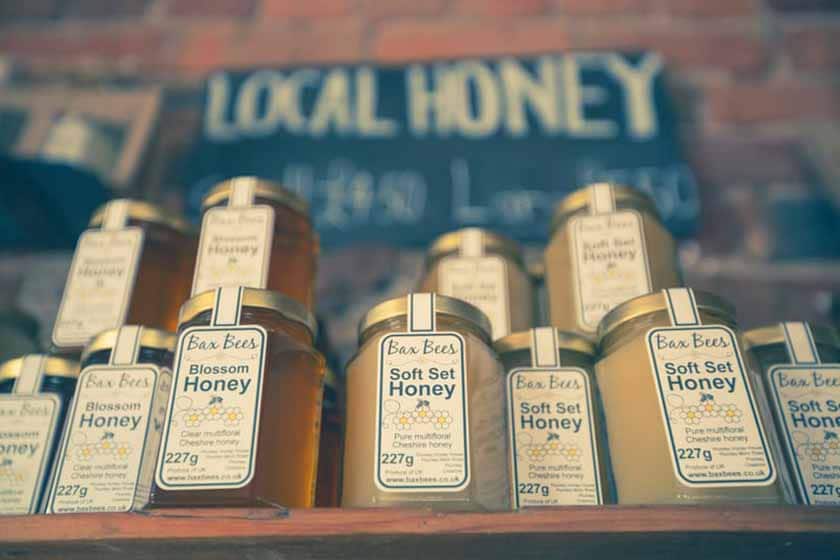Honey has been renowned for having major health benefits for centuries and is used as a medicine and natural antibiotic worldwide. But is honey good for your voice and recommended for singers?
Honey is a great superfood for singers. It can be taken in many forms – eaten raw, mixed in tea, taken in lozenges – and will reap lots of benefits for your voice. Honey can aid voice loss, soothe your vocal cords, and is a key ingredient in voice remedies.
Some singers will eat teaspoons of raw honey directly from the jar to soothe their voice. As part of a healthy diet, honey is good food for your singing voice, but to avoid its thick consistency impeding your airways, it’s best to learn what recipes and types of honey are best for you.
Is honey good for singers?
Can Honey Get Your Voice Back
Honey’s not just a superfood, it’s a medicine too. Since the ancient times of the Egyptians and Greeks, honey has been hailed as a natural aid to good health and longevity. Honey boasts lots of health benefits for singers, too.
Honey is known to have powerful soothing effects on your voice, vocal cords, and throat. It’s rich in antioxidants and has antibacterial properties which help fight bacterial infections in the throat. Honey can help singers recover quicker from strained, sore, and lost voices.
But honey isn’t just effective when you’re ill; it can be used to prevent vocal problems too. Its thick, smooth consistency coats and lubricates the throat, providing relief to your vocal cords and voice after a strenuous performance. Honey would be a good thing to regularly feature in your diet as a singer. Treat your throat to a soothing, warm honey drink before or after every performance to reap its vocal benefits.
How to use honey for your voice
Honey is a versatile ingredient that lends itself well to lots of recipes. Whether you’re already in the throes of a sore throat or are trying to prevent voice strain before it takes hold, honey can be used in lots of ways to benefit your voice:
- Honey water – Boil some water and allow it to cool slightly. Add 1 – 2 teaspoons of honey and drink while it’s still warm.
- Ginger tea sweetened with honey – To make your own ginger tea, boil two cups of water in a saucepan. Add one teaspoon of grated or powdered ginger and turn off the heat. Leave to mellow in the pan for 10 minutes, then strain the tea and add 1-2 teaspoons of honey to taste.
- Gargling with honey – Add a teaspoon of honey to a cup of warm water and gargle with it to soothe your throat. You can then drink the honey water afterwards for double the healing power!
- Honey and lemon tea –Simply add lemon and honey to warm water to create your own antioxidizing tea with the benefits of both honey and lemon.
Honey and lemon for voice
Curling up with a mug of warm honey and lemon will work wonders for your sore throat. Honey and lemon are both superfoods for singers and have bacterial fighting qualities which will aid your voice in its recovery from all types of illness.
Honey and lemon are an impressive cold-fighting combination. Lemon contains pectin which is thought to act as a natural disinfectant for the human body. It’s also rich in vitamin C, another vitamin known to help fight infection.
Honey also has antibacterial qualities, as well as lots of nutrients like iron, calcium, and magnesium to keep your body strong enough to fight an infection like laryngitis or the common cold. Pairing honey with lemon will reap more rewards for your voice, but avoid using synthetic packaged citrus honey products if you can. Instead, use fresh, natural lemon and organic honey to make your own tea blends.
Does honey help vocal cords?
The things we eat and drink don’t come into direct contact with our vocal cords. Consuming honey when you’re ill won’t directly touch and wash off your vocal cords, but it can help aid your recovery.
Honey is considered one of the best natural antibiotics. It contains hydrogen peroxide and sugar, which help reduce the growth of bacteria in your throat when you’re suffering from a cold or virus. Soothing your throat will take the pressure away from your vocal cords, allowing them to recover.
The best types of honey to help your vocal cords are raw, dark versions. These won’t feature added sugar or sweeteners, which can be bad for singers. Manuka honey and Jarrah honey are among the best types to try for vocal recovery, as they offer the most health benefits.
Honey for voice loss
Losing your voice can feel like the end of the world for a singer. There’s no quick-fix solution to get your voice back, but honey can definitely help speed up the process.
Honey is a natural antibiotic and will be kinder on your throat than taking decongestants. Over-the-counter decongestants can dry out your throat and make your mouth feel more painful. Eating a teaspoon of raw honey or adding it to warm water will lubricate your vocal cords and act as a natural alleviant.
Sucking on a sore throat lozenge might relieve some of the discomforts of a lost voice, but lots of sore throat sweets can be packed with sugar. Sugar will coat your throat and hinder your voice from coming back. Menthol-based lozenges are also best avoided as they will cool your throat but can numb your vocal cords.
Choose non-menthol, natural-based lozenges to bring back your voice instead. Lozenges that are plant–based and made with lemon, apple, aloe vera or honey extract will be kinder on your vocal cords. Burt’s Bees honey lozenges are a good choice because they contain natural honey extract as a sweetener, which will help soothe your throat.
What helps soothe your throat for singing?
Don’t leave it until the day of your performance to start soothing a sore or strained throat. You should pay attention to what you’re eating and drinking in order to help your throat as much as three to seven days before your show.
In the week leading up to your performance, always keep yourself hydrated. Water is one of the best ways to keep your vocal folds supple and stop your throat from drying out. For a more flavoursome drink, hot water with grated ginger and honey will soothe your throat in the build–up to a show.
On the day of your performance, you can use hot water steam inhalation to soothe your throat. You can do this at home by filling a bowl with hot water and leaning your face directly over the water and steam. The warm air will clear your passages and make you feel less congested before you sing. Try this followed by a teaspoon of raw honey to get your vocal cords fully lubricated again.
Lost voice from a cold?
There can be many causes for a lost voice. One of the most common is laryngitis, which starts from a viral infection like the common cold.
Laryngitis causes your vocal cords to swell and your voice box to become inflamed and irritated. It’s common to suffer from acute laryngitis (when your voice becomes hoarse and raspy) when you have a cold.
To get your voice back when you’re ill, you have to tackle all the symptoms of the cold. Superfoods like honey, lemon, ginger and apple cider vinegar will all help your recovery and provide relief for your throat and larynx. But to ensure you’re targeting all areas of the cold, you need to pair a healthy diet with rest, drinking plenty of fluids and taking painkillers.
Honey works as a great cough suppressant. Coughing is a common symptom of laryngitis and the common cold and can make your voice hoarse. Try two teaspoons of honey at bedtime to relieve your cough.
Essential oils for laryngitis
Laryngitis can cause your vocal cords to swell and your voice to crack or disappear completely. It can be really painful and will require you to take complete voice rest. Luckily, these essential oils have been found to help get your voice back quicker when you’re suffering from a sore throat:
- Peppermint
- Ginger
- Eucalyptus
- Lavender
- Lemon
- Tea tree
You can use essentials in a diffuser or apply them to the skin to get the best results. Never ingest essential oils as this is dangerous.
Lost voice from yelling
When you lose your voice, your body is trying to tell you something. If you lose your voice from yelling or singing, it‘s most likely because you have strained your vocal cords.
Vocal strain can happen for all kinds of reasons: overuse, fatigue, and improper technique. It can develop into acute laryngitis if you don’t rest your voice and allow your vocal cords enough time to heal.
You can use the same remedies as you would treat a cold to recover from voice strain. But you will keep losing your voice if you don’t change your technique. The best way to prevent losing your voice due to strain is to warm up your vocals before a performance and practice a good breathing technique.
Voice remedies for singers
It’s best to catch a sore throat early. If you feel your voice faltering, try any of these simple remedies to relieve and soothe your voice:
- Drink Aloe Vera – Aloe contains powerful antibacterial and antioxidant properties. You can buy aloe vera water, juice, and smoothies to relieve inflammation in your throat.
- Drink apple cider vinegar -Add one to two tablespoons of raw apple cider vinegar to a glass of water to help keep infection at bay. If the sharp taste puts you off, add some honey to the drink to make it sweeter.
- Add lemon to Slippery Elm tea -Some singers swear by Slippery Elm tea when they have a sore throat or hoarse voice. The tea is made with ground bark and coats the throat, relieving inflammation and congestion. Adding a wedge of lemon will make the drink’s healing properties even more powerful.
- Use ginger – whether you use it in tea, cut it up into a stir fry, or suck on candied ginger, eating ginger in any form will have a detoxing effect on your body and help fight off any illnesses.
Frequently Asked Questions
How long does it take to get your voice back?
The recovery time for a lost voice will depend on the cause. Seasonal allergies, vocal strain, laryngitis, and upper respiratory tract infections can all affect your vocals.
Infections should usually take a few days to start clearing up by themselves. If your symptoms persist after a week, you should contact your doctor.
If your voice has become hoarse from vocal strain, you should rest your voice for at least a couple of days and only return to singing when it’s fully recovered. Even if your voice has returned, it doesn’t mean your cords are fully recovered. Always warm up your vocals and don’t overuse or strain them.
Does honey help you get your voice back?
Honey will help you get your voice back by fighting the infections that can cause voice loss. It can also soothe the discomfort of a sore throat and inflamed vocal cords.
Honey will help your recovery process, but it’s not an overnight solution. It’s important to properly rest your voice when you experience any symptoms of vocal discomfort. Regaining your voice doesn’t necessarily mean you are fully recovered or ready to sing again. Rushing into singing before you are ready might hinder your voice’s recovery.
Have you used honey to help improve your singing voice? Let us know if you’ve got any additional tips in the comments below!











